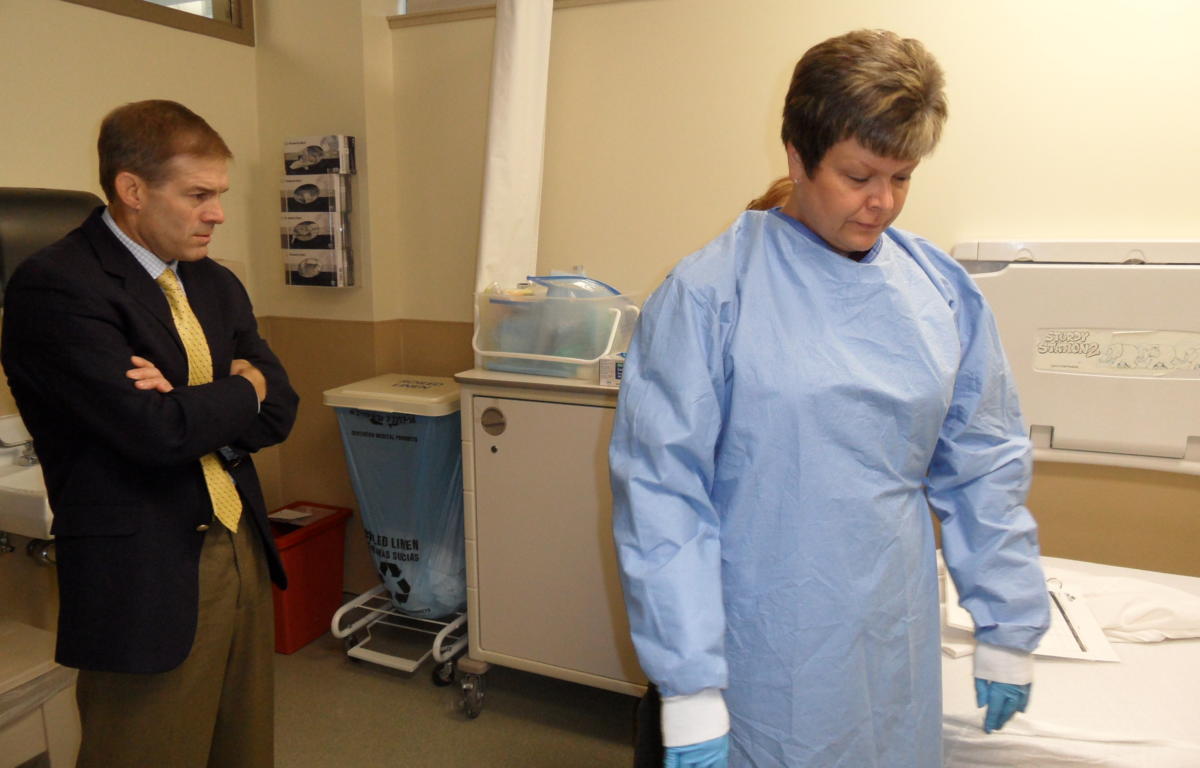By Gary Ogle
gogle@wbcowqel.com
One nurse got dress up Thursday morning for Congressman Jim Jordan’s visit to the Galion Community Hospital emergency room. Not in the spirit of Halloween, although everyone in attendance would have conceded the circumstances that could require her to be covered head-to-toe was certainly scary.
It was a demonstration of the protocols in place at Avita should the hospital in Galion or Bucyrus have a patient who exhibits signs or symptoms of having been infected with the Ebola virus.
“Our goal is to isolate, transfer and decontaminate,” said Amiee Milligan who explained the entire procedure as the nurse demonstrated the preparations required to enter the room of a person hospital personnel considered to have been potentially infected.
Milligan explained that the local facilities did not have the necessary equipment to actually test for the Ebola virus. That would have to be done at a much larger hospital, most likely The Ohio State University Medical Center.
“We want to identify them in screening as a potential person of interest and then transfer them for testing,” Milligan said.
 The procedure is far from a simple gown up and don a mask. The nurse, or any medical professional, preparing to enter a potential Ebola patient’s room, starts with one set of gloves, leggings, a gown, hair net, mask and finally another set of gloves. The process requires a partner to not only assist them in the meticulous process, but also to double check and make sure the process is being followed to the smallest detail.
The procedure is far from a simple gown up and don a mask. The nurse, or any medical professional, preparing to enter a potential Ebola patient’s room, starts with one set of gloves, leggings, a gown, hair net, mask and finally another set of gloves. The process requires a partner to not only assist them in the meticulous process, but also to double check and make sure the process is being followed to the smallest detail.
Finally a second set of gloves goes on: then and only then can the nurse enter the room. Taking the gown off is even more laborious, often requiring the sanitation of glove-covered hands that have come in contact with contaminated materials including the gown. All of the clothing must be carefully rolled and safely disposed of.
Portman noted Galion was one of several hospitals he has visited in his district.
“Every single one, the health care professionals, the nurse who is charge of infectious disease protocol, the doctors we’ve talked to, in each and every case they say they are doing what they think they need to do to be ready in case this would happen,” Jordan said. “They’re trying to be as ready as they can be. That’s exactly what we hoped would be going on and that’s what appears to be the case.”
 Milligan noted the hospital still was not in possession of a full face shield that would further limit skin in the neck area to exposure. Those items, while in possession of the Ohio Department of Health, have not been released to hospitals the size of Galion and Bucyrus at this point.
Milligan noted the hospital still was not in possession of a full face shield that would further limit skin in the neck area to exposure. Those items, while in possession of the Ohio Department of Health, have not been released to hospitals the size of Galion and Bucyrus at this point.
In the case a patient comes to the ER that is thought to have been in contact with the virus, a third person will always be watching outside the room, also ready to enter in the case of an emergency.
“The goal is once that nurse is in the room, she is in the room until the patient leaves,” Milligan said.
Avita CEO Jerry Morasko was also present and encouraged the congressman and other legislators to be extra conservative in their approach to addressing the issue.
“Almost without exception they have said a travel restriction makes sense to them,” Jordan said of what he’s hearing form medical professionals and administrators in his district. “That makes sense to us as well. We do have a hearing tomorrow in the Oversight Committee on this this issue.”
Morasko was appreciative that Jordan took the time to witness and understand the extensive procedure required to deal with potential Ebola patients. But he added, what was important to him as an administrator is that the government officials took the proper steps on their end to limit the spread of the virus.
“It could be a real serious situation if it spreads. I think you take every step to make sure that this doesn’t spread,” Morasko said. “When that second person got into Ohio that was a big fear for our staff, where we felt what it could be like if it did spread.”
Jordan was also scheduled to be in Bucyrus Thursday morning, not to be at the hospital, but to visit with Armed Service veterans at City Hall.


